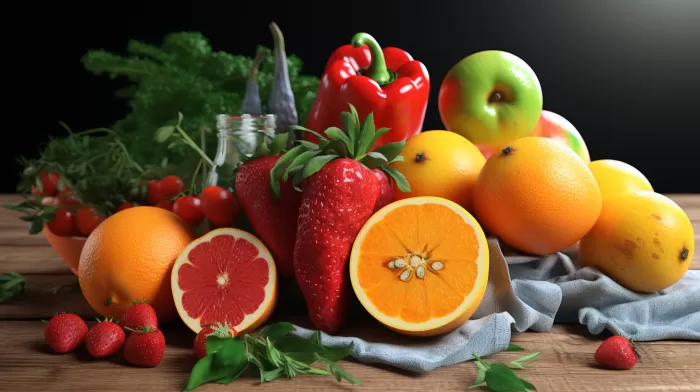Your heart loves one particular vitamin — and a plentiful dose of this nutrient feeds your heart health. So if you’d like to reduce your chances of dying earlier in life from a heart problem, as the research indicates, make sure you get plenty of it. A plus: It’s typically in the tastiest foods.
Research at the University of Copenhagen looked at the genetics and diets of about 100,000 people and found that those who had meals full of vitamin-C rich fruits and vegetables suffered a lower rate of cardiovascular disease.
“We can see that those with the highest intake of fruit and vegetables have a 15 percent lower risk of developing cardiovascular disease and a 20 percent lower risk of early death compared with those who very rarely eat fruit and vegetables,” says researcher Camilla Kobylecki. “At the same time, we can see that the reduced risk is related to high vitamin C concentrations in the blood from the fruit and vegetables.”
The researchers point out that vitamin C helps the body with a long list of important functions. It is necessary to construct connective tissue that supports the body’s organs. It also serves as an important antioxidant that defends the cells from damage often linked to artery and heart issues. And, unlike most animals, the human body can’t make its own vitamin C. Like bats, apes and guinea pigs, we have to eat foods – or take supplements — that contain this nutrient. (In contrast, your dog and cat have bodies that can make their own vitamin C.)
“We know that fruit and vegetables are healthy, but now our research is pinpointing more precisely why this is so,” adds researcher Boerge Nordestgaard. “Eating a lot of fruit and vegetables is a natural way of increasing vitamin C blood levels, which in the long term may contribute to reducing the risk of cardiovascular disease and early death.”
Nordestgaard also believes that it’s better to get your vitamin C from food rather than supplements, although I think that it can’t hurt to get it from both. But I agree that taking supplements, even if they are very high quality, can’t make up for the negative effects of junk food diet. Your body does better with healthy meals filled with organic fruits and vegetables along with a prudent dose of supplements.
Get the Most Out of Vitamin C-Rich Foods
It’s important to note that vitamin C is a water-soluble vitamin, meaning it dissolves in water. This has implications on how to get the most benefits out of vitamin C-rich foods. Cooking methods that involve water, such as boiling or simmering, can cause significant losses of vitamin C in fruits and vegetables. To minimize this loss, consume vitamin C-rich foods raw or minimally cooked whenever possible. Additionally, avoid storing fruits and vegetables for long periods of time, as vitamin C content decreases over time.
Top Sources of Vitamin C
Oranges are the first food that comes to mind when we think about vitamin C, but there are actually lots of other foods that have a higher concentration of C. Here are some of those foods, and I hope you’ll incorporate plenty of them into your diet:
- Red bell pepper and green bell pepper: Bell peppers are not only a great source of vitamin C, but they also contain vitamin A and antioxidants that support immune health.
- Kale: This leafy green is a powerhouse of nutrients, including vitamin C, vitamin A, and calcium.
- Broccoli: High in vitamin C and other nutrients, broccoli has been shown to have cancer-fighting properties.
- Papaya: Rich in vitamin C, papaya also contains enzymes that aid in digestion and reduce inflammation.
- Strawberries: These tasty berries offer more than just vitamin C, they’re rich in antioxidants and other nutrients as well.
- Cauliflower: While less colorful than some other vitamin C sources, cauliflower is still a great option with a milder flavor.
- Brussels sprouts: Another cruciferous vegetable with high levels of vitamin C, as well as fiber and other nutrients.
- Pineapple: In addition to vitamin C, pineapple is a good source of the enzyme bromelain, which has several health benefits.
- Kiwi: This fuzzy fruit is packed with vitamin C and other nutrients like potassium and fiber.
- Mango: High in both vitamin C and vitamin A, mangoes are a tasty treat with numerous health benefits.
Enjoy your vitamin C. Your heart will appreciate the effort to keep it healthy!
Additional Health Benefits of Vitamin C
While the heart health benefits of vitamin C are significant, it’s also important to recognize the many other health benefits this essential vitamin provides. Some of these include:
- Boosting the immune system: Vitamin C is well-known for its role in supporting the immune system and helping to ward off colds and other illnesses.
- Promoting healthy skin and wound healing: As a key component in the production of collagen, vitamin C helps keep the skin looking youthful and can aid in the healing process for cuts and wounds.
- Supporting eye health: Vitamin C is important for maintaining the health of blood vessels in the eyes and may help prevent age-related macular degeneration.
- Reducing inflammation and oxidative stress: As an antioxidant, vitamin C helps protect against the damage caused by free radicals and can reduce inflammation in the body, which may contribute to numerous health issues, including cancer and heart disease.
Incorporating vitamin C-rich foods into your diet can provide numerous health benefits beyond just supporting heart health. Developing a habit of consuming these foods regularly can be a delicious way to help protect your overall health and well-being.



